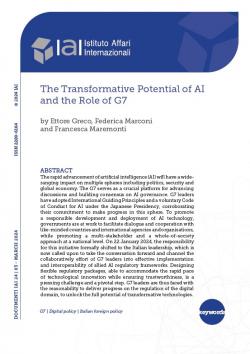The Transformative Potential of AI and the Role of G7
The rapid advancement of artificial intelligence (AI) will have a wide-ranging impact on multiple spheres including politics, security and global economy. The G7 serves as a crucial platform for advancing discussions and building consensus on AI governance. G7 leaders have adopted International Guiding Principles and a voluntary Code of Conduct for AI under the Japanese Presidency, corroborating their commitment to make progress in this sphere. To promote a responsible development and deployment of AI technology, governments are at work to facilitate dialogue and cooperation with like-minded countries and international agencies and organisations, while promoting a multi-stakeholder and a whole-of-society approach at a national level. On 22 January 2024, the responsibility for this initiative formally shifted to the Italian leadership, which is now called upon to take the conversation forward and channel the collaboratively effort of G7 leaders into effective implementation and interoperability of allied AI regulatory frameworks. Designing flexible regulatory packages, able to accommodate the rapid pace of technological innovation while ensuring trustworthiness, is a pressing challenge and a pivotal step. G7 leaders are thus faced with the reasonability to deliver progress on the regulation of the digital domain, to unlock the full potential of transformative technologies.
-
Details
Rome, IAI, March 2024, 11 p. -
In:
-
Issue
24|03
Introduction
1. Regulatory hurdles in the age of AI: Challenges and implications for AI governance
2. Advancing AI governance under Italy’s G7: Implementation mechanisms and future action
3. Three critical issues
4. Looking forward: Recommendations for G7
References



